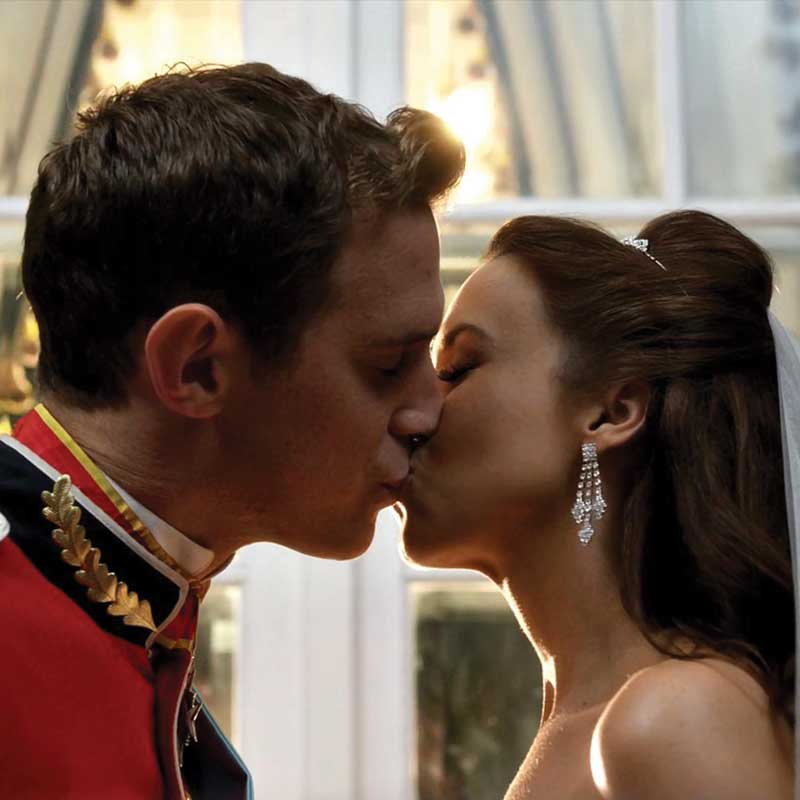In Lola, Andrew Legge’s Anglo-Irish microbudget fantasy set during World War II, two English sisters invent a sci-fi gizmo enabling them to tune in to TV and radio broadcasts from the future. At first it’s all fun and games and sneak previews of David Bowie, but then their attempts to help the Allied cause go horribly wrong, and before you know it – oops! – their well-meaning actions have altered the timeline and the UK is being run by Oswald Mosley and his Blackshirts.
The “what if” speculation of Alternative History is one of fiction’s most beloved subgenres. What if (see Pavane by Keith Roberts) Queen Elizabeth I had been assassinated? What if (see The Alteration by Kingsley Amis) the Reformation had never taken place? What if (see Anno Dracula by Kim Newman) Dracula had killed Van Helsing and married Queen Victoria and the UK had gone full-on vampire? Yes, I realise Dracula is a fictional character but, you know – what if?
Since World War II, one of the most recurrent “what ifs” has been “What if the Nazis had won?” or variations thereof. A key text here is Philip K Dick’s brain-scrambling The Man in the High Castle (1962), which pivots on the premise that Giuseppe Zangara’s 1933 assassination attempt on President-elect Franklin D Roosevelt succeeded, leading to America pursuing a non-intervention policy, the Axis powers triumphing, and America carved up between Imperial Japan and Nazi Germany. Dick’s novel was adapted for TV in 2015, followed five years later by a mini-series based on Philip Roth’s The Plot Against America, in which xenophobic aviation hero Charles Lindbergh is elected President in 1940, and the US becomes even more anti-Semitic than it is already.
Britain still likes to think of itself as the plucky little island that stood firm against fascism while cheese-eating surrender monkeys like the French crumbled and collaborated. But the idea that Britain itself could have formed a Vichy-type government (Buxton, perhaps? Or Highland Spring?) isn’t so far-fetched, given how many members of the English aristocracy were Nazi sympathisers in the 1930s. Romantics who like to think Edward VIII’s abdication was a story of true love (a delusion espoused by Madonna in her nutty 2011 Wallis Simpson quasi-biopic, W.E.) were gently disabused by an episode of The Crown that focused on The Marburg Files, revealing correspondence between the Duke of Windsor and Nazi high command, and the outlines of a plot to reinstall Edward on the British throne in the event of a German occupation of the UK. It was a scheme that no doubt seemed quite feasible, since the Duke and Duchess had dropped in to see Hitler with a merry Sieg Heil as late as 1937. And let’s not even mention the subsequently unearthed home movie footage of Uncle Eddie and his mum teaching seven-year-old Princess Lilibet how to do a Nazi salute on the lawn outside Balmoral.
Remember, two out of six posh Mitford sisters were full-on fascist sympathisers. Mosley (who married Diana) also makes a fleeting guest appearance – in a framed picture alongside Hitler’s on the wall of a Whitehall office – in the seminal “what if” post-war indie, It Happened Here: the story of Hitler’s England (1964). Made by future film historian Kevin Brownlow and Andrew Mollo when they were teenagers, this eight-years-in-the-making, low-budget movie showed how easily a neutral civilian, in this case a nurse, could end up embracing the fascist cause. The shocked press reaction was less from the images of the SS parading across Regent’s Park than from the suggestion that large segments of British society would have collaborated so readily.
It’s the opposite of that astonishing piece of wartime propaganda, Went the Day Well? (1942), in which an advance guard of Germans pose as Brits to occupy the idyllic English village of Bramley End. When the invaders’ true identity is betrayed by a careless bar of schokolade, all the villagers, from vicar to postmistress to land girls, fight back against the enemy in an orgy of almost Tarantino-esque violence. With one exception! The squire turns out to be – what else? – a sneaky fifth columnist. Honestly, what else do you expect of English poshos?
Britain still likes to think of itself as the plucky little island that stood firm against fascism
As World War II recedes into the past, the British seem as fixated on Nazi Germany as ever, whether it’s Boris Johnson comparing the EU’s attempts to unify Europe to Hitler’s attempts at creating a superstate, or the N-word now bandied around by pundits of all stripes so often that it’s ceasing to have any meaning, especially when right-wing nutjobs keep claiming the Nazis were “left-wing”. One yearns for Mel Brooks’ Springtime for Hitler, and the days when the British tried to disguise their Germany obsession beneath a veneer of ‘Allo ‘Allo-style larks, or the marvellous That Mitchell and Webb Look skit in which a man in an SS uniform has an epiphany and asks: “Are we the baddies?” But the Fawlty Towers one-liner “Don’t mention the war” now seems to have passed into common parlance to mean the exact opposite: try to mention the war, and the Nazis, as often as you can.
Anne Billson is a film critic, novelist and photographer






